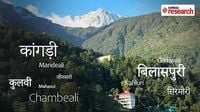RONO HILLS, 8 May: Legislative Assembly Speaker Tesam Pongte called for a “vigorous revival” of Arunachal Pradesh's traditional shamanic chanting languages. This appeal came during the inauguration of a two-day Sanskrit orientation workshop titled ‘Sanskrit and Sanskriti: Unearthing the Repository of Knowledge in the Traditional Indian Knowledge System’, organized by the Centre for Online and Distance Education (CODE) at Rajiv Gandhi University, in collaboration with the Institute of Open and Distance Education at Central Sanskrit University, New Delhi, held from May 7 to May 8, 2025.
Pongte emphasized that these languages are not merely tools for communication but are vital components of the cultural identity, stating, “These tongues are more than mere vehicles of communication; they enshrine our collective memory, our myths of origin, and our covenant with nature.” He elaborated on how each chant and ritual song encapsulates knowledge about medicinal plants, seasonal cycles, and ethical frameworks unique to Arunachal’s diverse tribes.
Highlighting the urgency of preserving these traditions, Pongte warned that neglecting to document and teach these chanting practices could lead to an irreversible cultural loss for Arunachal’s communities. He drew parallels to the nationwide revival of Sanskrit, which has seen dedicated institutions and community initiatives sparking a renaissance, and urged attendees to forge partnerships between universities, local elders, and youth groups. “Let us harness the blueprint of Sanskrit’s resurgence – its peer-tutoring circles, immersive language camps, and digital archives – to craft a renaissance of our own shamanic chants,” he added.
RGU Registrar Dr. NT Rikam supported Pongte’s call, asserting that “without Sanskrit, there is no sanskriti,” and suggested that the successful revival strategies for Sanskrit be applied to preserve Arunachal Pradesh’s indigenous languages and oral traditions before they vanish.
The programme’s convener, Moyir Riba, celebrated the workshop’s alignment with the national 1008 Sanskrit Sambhashan Shivir Abhiyan by Sanskrit Bharti. “This orientation marks RGU’s unwavering commitment to cultivating Sanskrit learning nationwide,” she remarked, calling the event a pivotal milestone in the broader mission to elevate Sanskrit as a living linguistic treasure.
In his keynote address, Prof. Prahlad R Joshi, Vice-Chancellor of Kumar Bhaskar Varma Sanskrit & Ancient Studies University, Nalbari (Assam), reminded attendees that “Sanskrit is woven into the very identity of Arunachal Pradesh.” He pointed out that there are seven villages where Sanskrit remains the primary spoken language and encouraged participants to view Sanskrit not as an archaic relic but as a vibrant medium capable of enriching modern discourse.
A panel discussion on ‘The Need for Sanskrit Education in the Context of Arunachal Pradesh’ convened four distinguished scholars who explored both the historical trajectories and contemporary imperatives of Sanskrit learning in the region. Prof. Joshi traced the language’s illustrious past and examined its decline following Macaulay’s 1835 Minute, arguing that reviving daily Sanskrit fluency could enrich Arunachal’s multilingual environment and open new avenues for research in philosophy and environmental ethics.
RGU Hindi HoD Prof. Oken Lego discussed how the rise of Hindi has fostered statewide literary expression, citing local poets and playwrights whose Hindi works spotlight tribal narratives. He proposed targeted certificate courses in collaboration with Central Sanskrit University to create career pathways in teaching, translation, and digital media.
RGU Hindi Department Assistant Professor Dr. VK Mishra provided an in-depth analysis of the structural elegance of Sanskrit grammar, detailing how 19th-century logicians like Charles Babbage and Hermann Grassmann were drawn to Panini’s formalized rules as precursors to algorithmic thinking. He highlighted modern computational linguistics research leveraging Sanskrit’s fixed morphology to improve language-processing models.
Over 200 participants, including scholars, students, and cultural enthusiasts from RGU, Vivekananda Kendra College of Teacher Education (VKCTE) Nirjuli, and Oju Mission School, Naharlagun, took part in the workshop, reflecting a strong community interest in preserving and reviving traditional languages.
Meanwhile, the struggle to preserve Pahari languages, spoken by millions in the Western Himalayas, continues. Despite being unrecognized in India’s official language policies, these languages face severe threats as younger generations increasingly adopt Hindi and English.
The Pahari languages, encompassing a variety of dialects, are categorized into Western, Central, and Eastern divisions, with significant linguistic variations due to geographic isolation. Sir George Abraham Grierson recognized these languages as a distinct subgroup within the Indo-Aryan family during his Linguistic Survey of India conducted from 1901 to 1928.
According to a 1996 survey, nearly 90% of Himachal Pradesh's population speaks Pahari languages, yet they remain unrecognized in official language policies. Many dialects, such as Kangri, Mandeali, and Chambeali, are often misclassified as “Hindi” due to a lack of formal recognition.
The 2011 Census recorded Himachal Pradesh's population at 6.86 million, with only 18.1% bilingual, indicating a shift toward Hindi at the expense of local dialects. For instance, Kangri is spoken by over 1.1 million people but is categorized under Hindi. Similarly, Mandeali and Chambeali have significant speaker bases yet face similar classification issues.
UNESCO classifies Pangwali as critically endangered, with only 18,640 speakers remaining. Other dialects, such as Keonthali and Sanori, are on the verge of extinction, with speaker numbers dwindling dramatically over the decades.
Efforts to revive the Tankri script, once used for Pahari languages, are ongoing, with a Public Interest Litigation filed in the Himachal Pradesh High Court demanding recognition of Pahari as an official language.
In March 2024, the Centre granted Scheduled Tribe status to the Pahari-speaking community in Jammu and Kashmir, a move that stirred tensions with the Gujjar-Bakerwal community, who viewed it as a dilution of their rights.
The Pahari languages now sit at the heart of a broader national conversation about identity and inclusion, caught between the push for constitutional recognition and fears of linguistic fragmentation.




